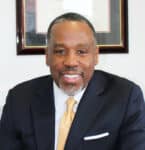 As a kid who was born and raised in Roxbury, I’ve seen the city’s skyline change. But as an entrepreneur, I have experienced a business climate which has largely remained the same.
As a kid who was born and raised in Roxbury, I’ve seen the city’s skyline change. But as an entrepreneur, I have experienced a business climate which has largely remained the same.
When I started as a general contractor in the 1980s, there were more minority business enterprises in the city then than there are today. That is a matter of fact. According to U.S. Department of Commerce, the number of African American-owned firms in the greater Boston area dropped by at least 16 percent in the last couple of decades.
A glass ceiling in the construction industry has prevented contractors like myself from growing as much as my white counterparts have. Opportunities to participate in development projects across that invisible line on Mass. Ave. and in downtown Boston have been limited for people of color and women.
I applaud Massport for recognizing this social and economic disparity and for having the courage to spark a cultural change. In 2017, they made diversity and inclusion one of four equally weighted criteria in the Summer Street Hotel RFP. The significance of this in the bidding process is huge. It was the first time that a public project in Boston required real emphasis on a diverse team.
Omni Hotel a Symbolic Landmark
Thanks to Massport, John Moriarty & Assoc., Janey Construction Management and our diverse team of investors and developers will have a symbolic landmark in the heart of the Seaport beyond just the stature of a 1,050-room hotel building. Our $500 million joint venture to build the Omni Hotel has already created over a thousand jobs and it will continue to contribute to the local economy once it opens ahead of schedule next year.
But the story of how Massport changed the business climate doesn’t end there and they want to build on the success of their diversity criteria.
On Oct. 8, they held the first-of-its kind networking event in the Seaport District. The event, dubbed “Building Partnerships,” drew over 150 people interested in expanding opportunities. Massport board member Warren Fields and CEO Lisa Wieland were there to reaffirm their commitment to diversity and inclusion. Boston’s Economic Development Chief John Barros was also there to promote the city’s efforts to work with a diverse business community.
I was impressed with the turnout. The room was buzzing with like-minded people looking to grow their connections outside the usual players in the city. Many people also came from out of state, from as far away as Colorado. Contractors, developers, architects, investors, consultants and business owners of different races and gender got together to seize the opportunity and get to know each other. This is how business should be across the city and the state: Diverse.
We need more state agencies and local governments to follow suit. We also need the private sector to step up to the plate. Why? Because building diverse partnerships makes good fiscal and moral sense. A cultural change is the only thing that’s sustainable. It’s up to us to advocate for that.
Greg Janey is president and CEO of Janey Construction Management




 |
| 
